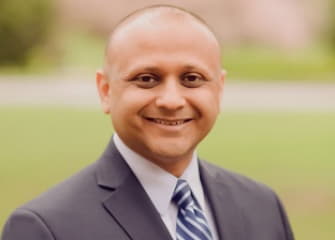
Harsh K. Trivedi, M.D., MBA
Click here for Part I & Part II
Largest non-profit provider of mental health, substance use, special education, and social support services in the nation
Harsh K. Trivedi, M.D., MBA is the president and CEO of Sheppard Pratt Health System (SPHS). A nationwide resource, SPHS provides 2.3 million services annually across a comprehensive continuum of care spanning hospital-based and community services. Since its founding in 1853, SPHS has been innovating the field with research, best practice implementation, and a focus on improving the quality of mental health care on a global level. SPHS has been consistently ranked as a top national psychiatric hospital by U.S. News & World Report for the past 26 years.
EDWIN WARFIELD: When the American Psychological Association launched the national mental health registry last year, Sheppard Pratt was announced as the first institution to join. Can you tell us more about the registry? What was behind that decision?
HARSH TRIVEDI: As I came to Sheppard Pratt, one of the questions that was really important for me was “How do we lead the country in terms of finding new ways to help people, not just in Baltimore and not just in Maryland, but really across the country and across the world?”
If you think about the development of registries, one of the things that has brought cancer care to where it’s at right now has really been the development of a cancer registry. The idea that every single encounter that folks have in terms of their cancer care is being documented, you know that this is what people came in with in terms of their symptoms, these are the types of cancer treatments that were tried, and what actually helped in terms of long term outcomes.
To date, there is no registry that actually covers all of psychiatric illness and substance abuse services. Why this registry is particularly important is because it provides a framework for collecting that data. It also provides the ability to search: What exactly is working for what subtypes or specific types of patient presentations? This, we believe, is a fundamental part of contributing back to the field, but also helping us propel forward.
We are at a point where across the country, it is very clear that there are substantial mental health and substance abuse needs in pretty much every community. We’re also at a point where there are more than enough people who want help. What we are trying to do is combine a substantial database of information that we already have, because we have a vastly greater number of patient visits than most any other place in the country, and provide that as the foundation to build upon.
The reason why it’s important for Sheppard Pratt to be the first entry into a national health registry for psychiatric illnesses is that we will provide a substantial amount of data. This also should hopefully give a certain level of credence as well as importance to this registry so that other health systems, as well as individual providers, see the importance of doing so. And hopefully it will lead to multiple more data inputs into such a registry.
The APA would basically say that that actually is happening right now, in the sense that after we signed on, it’s like anything else, where it’s hardest to get the first person on board. We thought it very much met our mission and our values to be a leader in that way as we have been for many things before, and we want to make sure that we also bring in our like-minded mental health organizations across the country, as well as medical centers across the country, because this is vital to bringing out outcomes that help entire communities do better.
Q. You recently released a statement about the 21st Century Cures Act. Why is this new law important, and how does it change what you do at Sheppard Pratt?
A. Congress recently signed the 21st Century Cures Act. It was a combination of different health-related legislative packages that were thought to have bipartisan support to bring about fundamental needs in terms of cancer and a host of other illnesses. As it pertains to mental health and substance abuse, there were a few provisions in there that were key—they come from other pieces of legislation that were already in play in Congress.
There’s a specific provision in there that deals with substance abuse services. About a month ago, six weeks ago, the US Surgeon General came out and really highlighted the issue of opioids across communities in America. One of the nice things that this bill does is it basically removes the issue of IMD [Institution for Mental Disease Exclusion], which is a very specific technical issue that says that folks who have substance abuse issues should be able to get detox services and access to care at Institution for Mental Disease facilities.
In our federal legislative rules, there is a complicated issue called IMD, which basically says that if you’re a freestanding psychiatric hospital, you will not get a federal match in terms of monies to cover mental health and substance abuse services for Medicare patients in the same way that you would be if you walked into any other medical center. The reason why this is important is because it actually reflects a pretty discriminatory practice back when Medicare was first created. At that time, you had mental asylums, people were in the hospital for long periods of time, and there was this thought that “if we funded the care of all these people, we would not have enough money in the system.”
Although times have changed, and psychiatric hospitals actually provide pretty acute care for people that are at that life and death situation, our regulations haven’t matched. One of the difficulties right now is the fact that as much as we exist and we are one of the largest providers of care—and without us you would not have the access that we need in Maryland—the IMD rule still exists. And so as much as we have an opioid problem, right now there is a disincentive that basically would say that people shouldn’t come to Sheppard to get care for their addiction issues because it would actually cost the state more money—not just for that, but also for mental health issues as well.
Fundamentally, part of why the 21st Century Cures Act is important is because it helps us to provide a way to provide greater access to folks for their care. It also highlights a number of things that are important in terms of making sure the right interventions are in place to save people, so we don’t have unnecessary deaths.
Connect with Harsh on LinkedIn
Sponsored by:

WMS Partners was founded in 1993 on the principles of providing our clients with the same level of service that a Chief Financial Officer (CFO) would dedicate to a successful corporation. As your advocate and central point for financial affairs, we work proactively with your service providers, including accountants, attorneys, consultants, insurance professionals and philanthropic advisors.
We are large enough that we provide exposure to many unique ideas and strategies in the investment, estate, tax, financial advisory and risk management arena; but small enough to provide discreet individualized guidance.


Edwin Warfield, CEO of citybizlist, conducts the CEO Interviews.
If you're interested in reaching CEOs, please contact edwin.warfield@citybuzz.co
Connect on LinkedIn



































